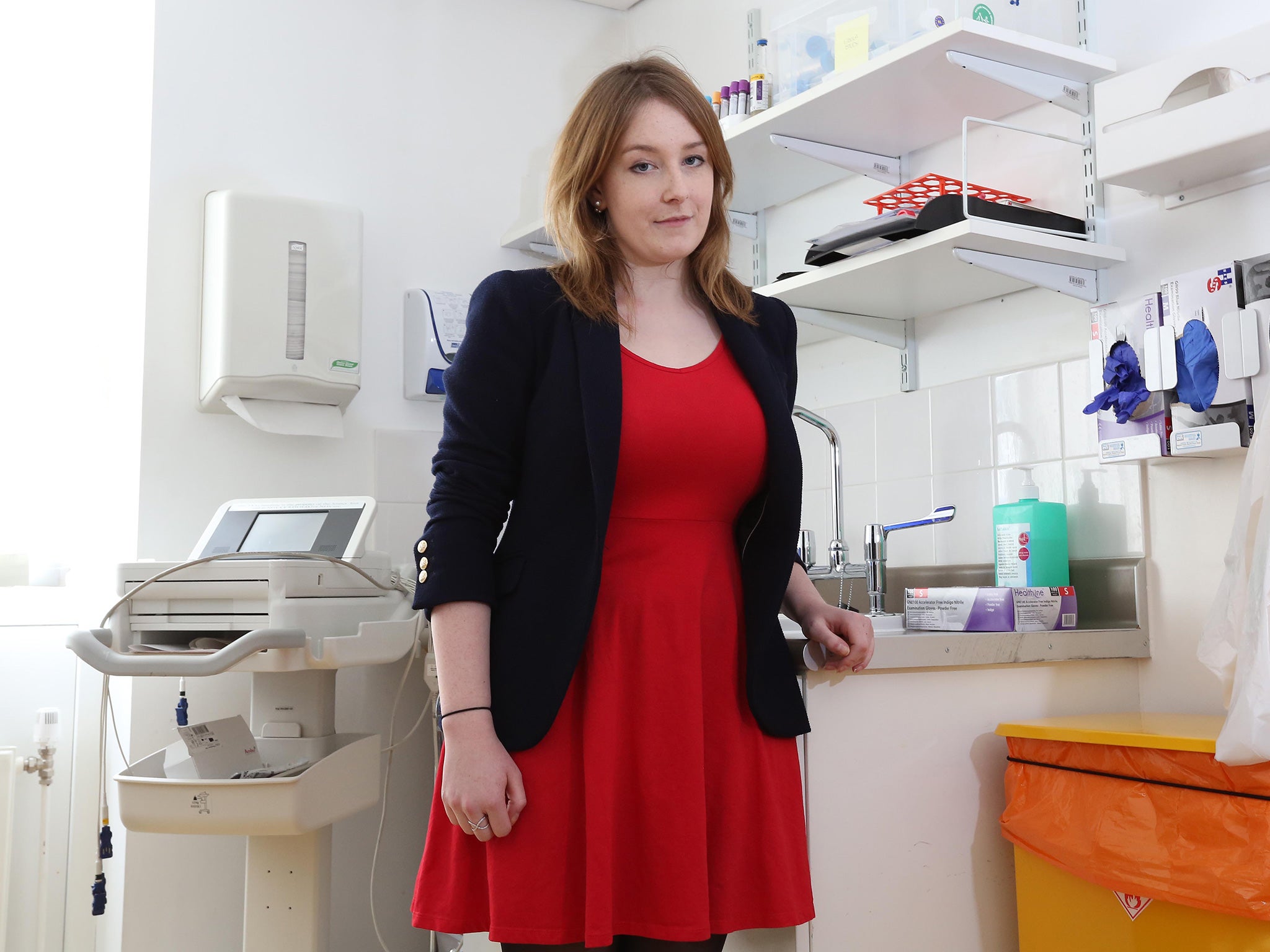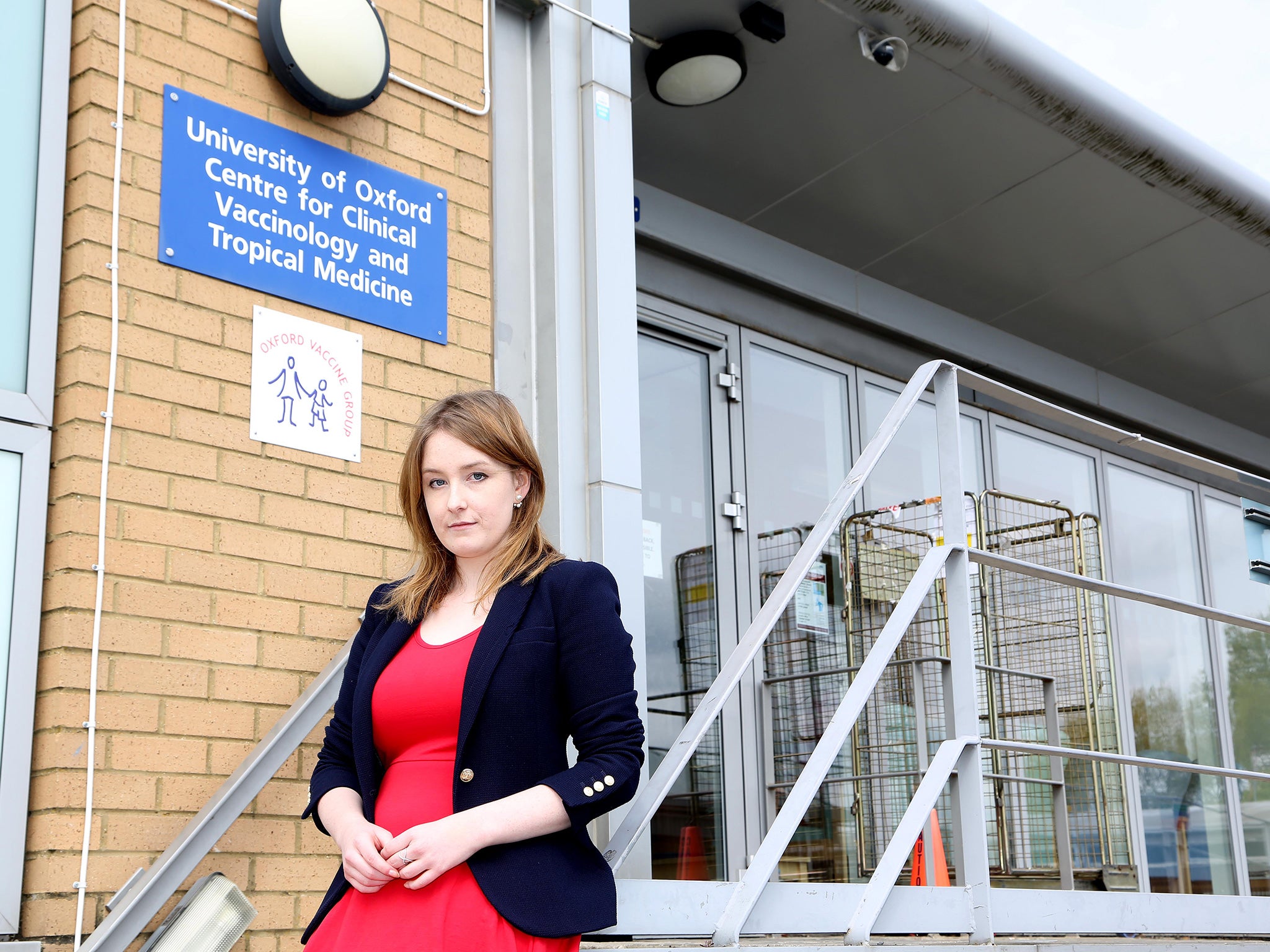My life as an Ebola vaccine guinea pig
Horrified by images of the disease in West Africa, Siobhan Fenton became one of 60 volunteers helping Oxford University scientists fight the virus

Your support helps us to tell the story
From reproductive rights to climate change to Big Tech, The Independent is on the ground when the story is developing. Whether it's investigating the financials of Elon Musk's pro-Trump PAC or producing our latest documentary, 'The A Word', which shines a light on the American women fighting for reproductive rights, we know how important it is to parse out the facts from the messaging.
At such a critical moment in US history, we need reporters on the ground. Your donation allows us to keep sending journalists to speak to both sides of the story.
The Independent is trusted by Americans across the entire political spectrum. And unlike many other quality news outlets, we choose not to lock Americans out of our reporting and analysis with paywalls. We believe quality journalism should be available to everyone, paid for by those who can afford it.
Your support makes all the difference.Watching the Ebola epidemic on our TV screens last summer, it was impossible not to be struck by the horror that was unfolding.
West Africa may be a distant place, but the images of infected bodies left out in the streets by people too afraid to touch their dead relatives were so heart-breaking that the suffering seemed immediate and personal.
In an age when we like to think medical advances protect us from the infectious diseases that have previously decimated populations, Ebola’s deadly spread left many in the West feeling a sharp sense of helplessness.
I was as shocked and distressed as anyone. But for family reasons, the peak of the Ebola scare brought back particularly chilling memories.
A few years previously, my brother had contracted a tropical disease whilst in Kenya. At home in Northern Ireland, my family and I heard the news down a crackling satellite phone call from a remote Kenyan village. Between the white noise, crackles and dial tones we pieced together fragments of the information. He had collapsed with what they thought was malaria, but had had an allergic reaction to the anti-malarial drugs, stopped breathing and been air-lifted to a hospital in Nairobi. He had been infected with an unknown tropical disease and parasites had entered his body. Eventually, under the care of Kenyan doctors, he recovered and became well enough to fly to back to Belfast – scrawny, wan, fragile, but otherwise – miraculously – fine.
So a few months ago when I received an email on an Oxford University alumni mailing list saying that scientists at the university were looking for volunteers for experiments in their bid to develop a cure for Ebola, I immediately said yes. The images of Ebola victims during last summer’s epidemic, combined with memories of the fear I’d felt as my brother battled a mysterious tropical disease, meant I didn’t need to think twice.

I was invited to an Oxford University hospital to talk it through. The white, single-floor building looked more like a bungalow or beach house than the hub of a race to cure one of the world’s biggest pandemics – and this calmed my nerves.
Once inside, a stony-faced doctor solemnly set out the risks, the university’s legal disclaimers and an overview of what they were trying to do. An hour’s worth of paperwork was sifted through, family health history pored over and then we reached the last page, ending with a dotted line for me to sign on.
I was sent off for blood tests and a full medical examination to check I was healthy enough to do the trial. After a few weeks, I got an email to confirm that I’d been approved as a volunteer – and was invited to return to Oxford the following week for my first prototype injection.
Doctors took seven small bottles worth of blood from my arm to take away for testing and then the syringe for the vaccine was brought out. With a little prick on my left bicep it was over.
Professor Adrian Hill, who is leading the trials, explains that his team are working on a number of different phases and trials in their bid to create the vaccine.
“We started the trial in mid-September last year. By mid-November we vaccinated all 60 volunteers with the chimpanzee adenovirus vaccine,” he says. “These 60 volunteers will soon have finished all six months of follow-up for that vaccine. But 30 of these volunteers agreed to have a booster vaccine to see if we could increase their level of immunity. This happened in late November and early December and they are currently being followed up for six months after that booster vaccine.”
Professor Hill says that volunteers are drawn to take part for a number of reasons, but the sheer scale of the Ebola epidemic meant that people wanted to contribute to their attempts to find a cure. “In this trial I would say essentially all 60 volunteers were largely motivated by wanting to help out in some way with the terrible Ebola outbreak in West Africa.
“In September when we started the trial the outbreak was escalating rapidly ... and no one knew if it would be possible to contain it or whether the virus would carry on spreading. So we saw lots of volunteers who regarded volunteering for this trial as their way of contributing.”
For my own part in the various trials, I received the first injection in February and have been going back for further vaccine doses and blood tests every couple of weeks. After one of the full batches of blood tests, I passed out. Being not much taller than 5ft, the seven bottles of blood doctors had taken was too much of a stretch.
But my body slowly got used to the blood loss week on week, and soon I only felt slightly dizzy after each session.
The scientists asked me to keep an electronic diary noting any side effects every day throughout. So far they’ve consisted mainly of a smattering of nose bleeds and one fit of flu-like symptoms after a jab, but nothing painful or startling.
One of the slighter odder effects has been a period when all food and drink tasted oddly rust-like; as if I was swallowing an ancient tin can at every meal.
On each trip to the hospital I try and gauge from the doctors whether the vaccine is working or not, whether they’re any closer to a cure. On some days they’ll seem jovial and relaxed about it, on others they’ll be a lot more serious and tense. It’s hard to tell if that’s any indication of how the trial is going, or if it’s just reflective of any one of a number of other things – office politics, life beyond the lab. Recently, I’ve tried to stop guessing and over-thinking quips or stern remarks, instead I’m just having to hope that they’re inching closer to a cure even if I can’t be told at what pace.
Join our commenting forum
Join thought-provoking conversations, follow other Independent readers and see their replies
Comments